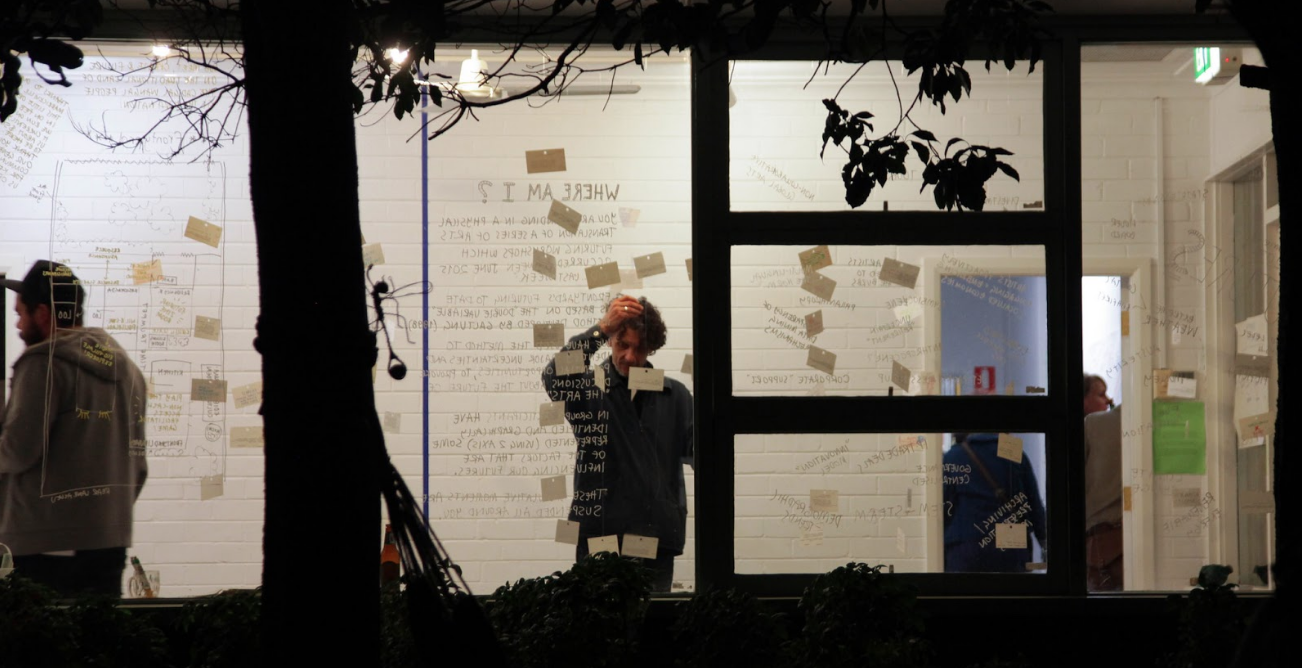
One of the slides from the talk: Looking in as people consider possible futures and how to reach them at Frontyard Projects in Marrickville, Sydney. Photo by Frontyard, CC BY SA
Last month Henare and I were in Hobart for linux.conf.au. We met lots of really nice people working on a dizzying array of interesting projects.
Linux.conf.au is Australia’s biggest conference for people building and using Free and Open Source Software. People come from all over the world to be there. Henare and Matthew from the OpenAustralia Foundation actually met at the conference last time it was in Hobart 2009, which kicked off Henare’s open source civic hacking.
I spoke on the last day of the conference. It was nerve-racking spot to be honest, but it also meant I got to learn from all the other speakers and draw some of their ideas together.
My talk Hacking democracy and playing the long game was about how I currently understand the ways OpenAustralia Foundation projects actually impact society. I’ve been thinking a lot lately about where our work to transform democracy stands in 2017. It seems like we’re in an important moment to really think about the impact of civic tech, and above all, continue working hard.
Giving this talk was a great opportunity to think this all through and share these ideas. Thanks so much to the linux.conf.au team for inviting me, supporting me to get there, and putting on such a great event—I really appreciate it.
Producing this talk became a way to think through all those ideas–so it does cover quite a lot of ground. It starts out talking about the elements of democracy that we’re interested in, different ways to think about it’s futures, and one framework for understanding how change happens drawn from Lawrence Lessig’s 1999 book Code and Other Laws of Cyberspace.
The second half gets into Right To Know as a case study. I go through how the project is making it easier for people to get information they need from our governments. In the end I go through the practical things you can start doing to support and contribute to this work.
I hope it’s interesting and useful. I’d love to know what you think.
If this sounds interesting and you’re new to the OpenAustralia Foundation, here’s some links for finding out more:
- About the OpenAustralia Foundation,
- A list of our projects with links
- All our open source code on GitHub
- OpenAustralia Foundation on twitter
- Come say hi at our Pub Meet in Sydney. Next one is February 28
- Get emails with our latest blog posts
All the conference talks are up on YouTube. Here’s some of the ones I most enjoyed:
- Land Matters: Creating Open Technology for Land Rights, by Kate Chapman
- The Internet of Houses: Whare Hauora, by Brenda Wallace, Amber Craig
- Human-Driven Development, by aurynn shaw
- I am your user. Why do you hate me?, by OpenAustralia Foundation Director Donna Benjamin.
- Designing for Failure by Dan Callahan
- Future privacy, by Michael Cordover
- Reproducible Builds for a Better Future, by Valerie Young
- Preparing For The Next Generation of Contributors
- Using Python for creating hardware to record FOSS conferences!, by Tim ‘mithro’ Ansell